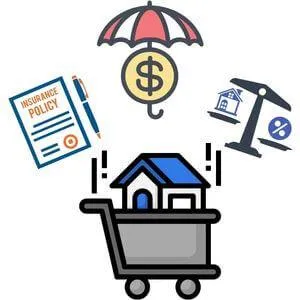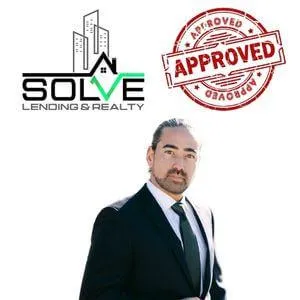

How to Stop Wasting Money on Rent
and Own a Home Instead!
If you’ve always rented a place to live, buying a home can seem like a monumental undertaking.
We'll break down the home buying process into clear steps.
You don't have to waste any more money on rent!
Why continue throwing your hard-earned cash out the window when you can buy a home with a low down payment and affordable monthly payments that meet your budget?
Imagine coming home to your own place that you can finally call your own. With Solve Lending & Realty, it's easier than you think. We'll help make the process simple and straightforward so you can get into your first home as soon as possible.
Seven Steps to Transition from Renter to Homeowner

#1: Identify Your Needs and Wants
Begin your search by considering the kind of home you need and want. Write down your specific requirements, such as the number of bedrooms, size of yard, floor plan, location, schools, etc.

#2: Determine How Much You Can Realistically Afford
Consider your budget and financial obligations. Decide what monthly house payment you can really afford. Most mortgage consultants advise limiting your payment to no more than one-third of your net monthly income. If you’re unsure, contact your mortgage consultant to assist with the calculations.
When you know in advance the amount of loan you can obtain, you can focus on searching for houses in your targeted price range. This can save you time when you find that perfect home, because sellers favor buyers who are pre-approved.
Experienced mortgage consultants can let you know what specific loan programs are best for you. By taking a look at your financial situation and credit history, a mortgage consultant will tell you if you can qualify for the home you want and will find a loan that best suits your needs.
For the approval process, you and your mortgage consultant will complete the required documentation and submit it to an underwriter. A pre-approval is an actual loan commitment from a mortgage consultant or lending institution. This means that you definitely qualify for a loan. Talk to your mortgage consultant about the costs and time involved to secure a pre- approval.
#4: Work With an Experienced Real Estate Consultant
You can learn a lot about consultants by talking to them about their experience. In a short time, you’ll be able to determine if they’re the right person to meet your needs.
Questions for Agents:
In what areas of town and price ranges do you specialize? (Keep in mind that some agents specialize in only one area or one price range.)
My objective is to buy a house by ___________. How will you help me achieve this goal?
How often will you update me with new property listings?

#5: Tips for Successful House Hunting
- Keep an organized record of your research. Write down comments about the homes you see. Keep track of your likes and dislikes and offer feedback to your real estate consultant. Some buyers are reluctant to tell an agent what they really think of a house; they think the agent might take it personally. Remember, the homes don’t belong to the agent!
- Make sure your agent is aware of your time schedule and expectations. Do you like to look at one or two homes per session? Four? Eight? Discuss this with your agent.
- Tell your agent about any homes you see that interest you and that you’d like to know more about. This includes homes you’ve "discovered" as you explore the area and those advertised online.
- If you like to spend time driving around by yourself looking at houses, ask your agent for a list of drive-bys – homes to consider first from the outside. Your agent can make appointments to show you the interior of the properties that appeal to you.
- It’s important to know beforehand whom your agent represents. Some agents work only for the seller.

#6: Make a Purchase Offer
Work with your real estate consultant to determine the most appropriate purchase offer. Your consultant will present the offer on your behalf.

#7: Save on Your Initial Investment and Monthly Payments
There are only two major investments to consider when buying a home. These are the initial investment, which includes the down payment and closing costs, and the monthly payment, which includes principal, interest, taxes and insurance. Here are some things to consider.
Initial Investment
- Consider a low or zero down payment loan. You don’t necessarily have to put 20% or even 10% down. You can pay 5%, 3%, or even zero down on some loans.
- Some Lenders have programs to cover your closing costs. Ask your mortgage consultant about them.
- As part of your offer, ask your real estate consultant about the seller paying some of your closing costs.
- Shop around for your homeowners’ insurance. A little comparison shopping can save you money.
- You may be able to deduct money paid for discount points from your gross income before computing your tax. See a CPA for more information.
Monthly Payments
Get a loan that doesn’t have monthly mortgage insurance premiums. You may be able to reduce or eliminate them by paying a little more at closing. By putting 20% or more down, you can eliminate them entirely. Talk to your mortgage consultant about other ways to eliminate monthly mortgage insurance payments.
Take advantage of rate lock programs that are currently available. You can generally lock in a low interest rate 30 to 45 days in advance. Secure an appraisal before you lock in a rate.
Remember that interest payments on a primary residential mortgage are fully deductible. Your property taxes are also deductible. Tax rates definitely favor homeowners. Be sure to declare both your mortgage interest and property taxes when you file your income tax returns.
Consider an adjustable rate mortgage. Adjustable rate mortgages (or ARMs) can be as much as 3% lower than fixed rates. Only choose this option when you’re in a position to refinance, should the adjustable rate rise sharply.

Company NMLS ID: 2013271
www.nmlsconsumeraccess.org
Equal Lender Opportunity

Equal Housing Opportunity
Company DRE ID: 02123993
www2.dre.ca.gov/PublicASP/pplinfo.asp
For information purposes only. This is not a commitment to lend or extend credit. Information and/or dates are subject to change without notice. All loans are subject to credit approval.
By submitting above, I authorize an affiliated Solve Lending & Realty representative to call me, send text messages and emails to me about property valuations and financing options at the number entered above even if I'm on a National or State "Do Not Call" list. You can opt-out anytime, data and message rates may apply.
©2022 Solve Lending & Realty


